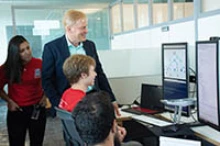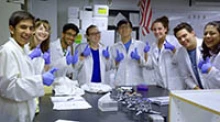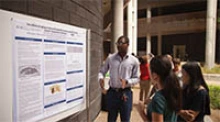Trading Pipets for Keyboards, UArizona’s KEYS Students Go Virtual for Summer Internship
The BIO5 KEYS Research Internship Program at the University of Arizona takes a new form this summer as 49 high school students engage in computational projects from the safety of their homes.

TUCSON, Ariz. – Since 2007, the BIO5 Institute has provided a unique, seven-week summer research opportunity to almost 500 outstanding Arizona high school students to date. Despite COVID-19, this summer won’t be any different.
Through the Keep Engaging Youth in Science (KEYS) Research Internship Program, talented high school students from across the state come to the University of Arizona to engage in bioscience research with the university’s best faculty. Interns not only receive research experience, but also receive training in science literacy and ethics.

High school students, as KEYS interns, learn about the role of big data in medical research in summer 2018 in the lab of Dr. Yves Lussier, director of the Center for Biomedical Informatics and Biostatistics at the UArizona Health Sciences campus in Tucson. This year, the students will participate remotely via digital connections in the KEYS program. (Photo: Deanna Sanchez/UArizona BIO5 Institute)
KEYS aims to educate and empower students to explore their passions for scientific discovery while advancing their academic, professional and personal goals. The program strives to increase the talent and diversity of students pursuing STEM degrees and careers, as well to retain students to in-state colleges and the Arizona workforce.
Because of the restrictions placed on in-person UArizona gatherings due to the COVID-19 pandemic, KEYS 2020 will pivot in the form of a virtual internship – instead of pipetting at the bench wearing white lab coats, interns will work from home on data science projects.
“When this COVID-19 outbreak occurred, we were really scared and disappointed that KEYS was going to be cancelled,” Sonia Mathur, a junior at Tucson’s University High School said.
Sonia will be joined by her brother Nikhil and sister Esha as 2020 KEYS interns.
“KEYS was kind of a needle in a haystack,” Sonia said, “so we were so stoked that KEYS will be able to rebound off (the pandemic) and create a virtual session.”
A Quick Transition
As soon as BIO5 leadership learned of the university’s on-campus COVID-19 restrictions and contemplated their options for this summer, they decided to transition KEYS to an online format.
“Despite losing the traditional hands-on component so integral to the KEYS experience, our program coordinators, Brooke Moreno and Kelle Hyland, have been working diligently with the rest of the KEYS support team and other BIO5 staff and student workers to ensure the essence and impact of the internship remains the same,” said Lisa Romero, senior director of public affairs, communications and engagement for BIO5. “This team has creatively and collaboratively pulled off something incredibly impressive in a very short timeframe, and I believe our KEYS interns will actually receive a value-add experience, not simply a replacement program.”
“We want to mirror the DNA of KEYS,” said Moreno of the program’s revised direction. “We’re just expressing it differently.”
Potential UArizona faculty mentors were immediately solicited for remote projects. While some of their labs had been temporarily shut down due to the pandemic, 20 of the original mentors were able to redirect their existing projects to fit the new KEYS model. With assistance from Jennifer Barton, PhD, director of the BIO5 Institute, the KEYS team connected with an additional 15 new faculty mentors who were excited to take on virtual interns.
In previous years, students were solely matched with faculty based on the research interests expressed in their interviews. But this year, once a new list of available mentors and projects had been compiled, students were asked to select their top choices. Nearly half were matched with their top choices.
From the Lab Bench to the Computer
Moreno and Hyland enlisted the help of Uwe Hilgert, PhD, associate research professor and director of industry relations and workforce development at BIO5, to adapt the existing KEYS curriculum to fit the new direction of the program. Because Hilgert has experience developing, gathering and sharing resources for online training and learning on computational techniques, he was the perfect addition to the team.
“With the opportunity this KEYS pivot provided, we are going to be able to introduce student participants to the concepts and tools required to work with big data, bioinformatics, virtual computing, programming, cybersecurity and many other aspects of data-intensive biomedical research,” said Dr. Hilgert.
“As this type of research is at the cutting-edge of scientific development, I can imagine this year's KEYS will serve as an excellent pilot program with the potential to pursue grant funding to help support KEYS for the next three to five years.”

With the addition of this year's cohort, 526 students will count themselves as KEYS alumni. (Photo: Deanna Sanchez/UArizona BIO5 Institute)
In previous years, students were immersed in a one-week crash-course in science literacy and ethics. This year, students will learn to “read like a scientist” in the weeks prior to the start of the program so the first week can be focused on understanding data science.
Dr. Hilgert will lead the students through courses on various programming languages and data ethics so they have the foundation they need to succeed once they begin their research projects.
Students will then work remotely for six weeks on projects that include using advanced Excel techniques to analyze genomic data, reviewing scientific literature and writing code for data analysis programs. They’ll also meet once a week in small groups to provide support and share resources on their projects. Several projects will involve COVID-19 data and literature analysis, allowing high schoolers to contribute to advances against this pandemic.
Yves Lussier, MD, associate vice president and chief knowledge officer for the UArizona Health Sciences, is no stranger to providing KEYS students with data science internships. Dr. Lussier, who is also the director of the Center for Biomedical Informatics and Biostatistics, says that students can combine computational methods with their own creativity to analyze data and generate knowledge in ways that would not be possible through traditional laboratory-based research.
“Modeling of biomedical problems from large datasets can unveil deeper knowledge than laborious fact collections,” Dr. Lussier said. “Students working in virtual labs are presented the opportunities to take a step back from laborious fact collections and contribute to further a science through imagination and analyses.

Instead of presenting a traditional poster at the end of the seven-week program, 2020 KEYS interns will share their findings virtually. (Photo: Deanna Sanchez/BIO5 Institute)
“In computational biology and biomedical informatics groups, experts have been trained to transform raw heterogeneous data into information that is easier to model. Reproducible and generalizable models that predict a previously unforeseen phenomenon produce knowledge, which in turn can lead to new model-anchored discoveries,” he added.
At the end of the summer, students traditionally present their work to family, friends and the community at an in-person public research showcase.
Despite COVID-19 restrictions, this year’s showcase will still go on – now virtually. Instead of poster presentations, students will give short PowerPoint presentations with an emphasis on methodology and ethics. Next summer, interns will be invited back to participate in the hands-on program culminating in the public showcase.
Keeping the Fun Alive
A favorite aspect of many interns is the social nature of KEYS. In previous years, students engaged in bi-weekly activities like hiking, bowling and potlucks in order to foster teamwork, collaboration and friendship outside of the lab.
KEYS assistants Robyn Pratt and Marissa Romero plan to maintain this cohort’s comradery through virtual ice breakers and socials like pet “show and tell,” a scavenger hunt and a movie night.
With the addition of this year's cohort, more than 526 students will count themselves as KEYS alumni. Nearly all program alumni either attended or are currently attending college to pursue STEM fields. About 75% of KEYS alumni have chosen to attend college in Arizona, with the majority of those attending UArizona. All KEYS alumni accepted to UArizona are automatically accepted into the Honors College and awarded three units of college credit at the completion of the program.
# # #
A version of this story appeared originally on the UANews, BIO5 Institute and KEYS Research Internship websites.
NOTE: Photos available upon request.
About the University of Arizona BIO5 Institute
The BIO5 Institute at the University of Arizona connects and mobilizes top researchers in agriculture, engineering, biomedicine, pharmacy, basic science, and computational science to find creative solutions to humanity’s most pressing health and environmental challenges. Since 2001, this interdisciplinary approach has been an international model of how to conduct collaborative research, and has resulted in disease prevention strategies, promising new therapies, innovative diagnostics and devices, and improved food crops. For more information: BIO5.org (Follow us: Facebook | Twitter | YouTube | Instagram | LinkedIn).
About the University of Arizona Health Sciences
The University of Arizona Health Sciences is the statewide leader in biomedical research and health professions training. UArizona Health Sciences includes the Colleges of Medicine (Tucson and Phoenix), Nursing, Pharmacy, and the Mel and Enid Zuckerman College of Public Health, with main campus locations in Tucson and the Phoenix Biomedical Campus in downtown Phoenix. From these vantage points, Health Sciences reaches across the state of Arizona, the greater Southwest and around the world to provide next-generation education, research and outreach. A major economic engine, Health Sciences employs nearly 5,000 people, has approximately 4,000 students and 900 faculty members, and garners $200 million in research grants and contracts annually. For more information: uahs.arizona.edu (Follow us: Facebook | Twitter | YouTube | LinkedIn | Instagram).

